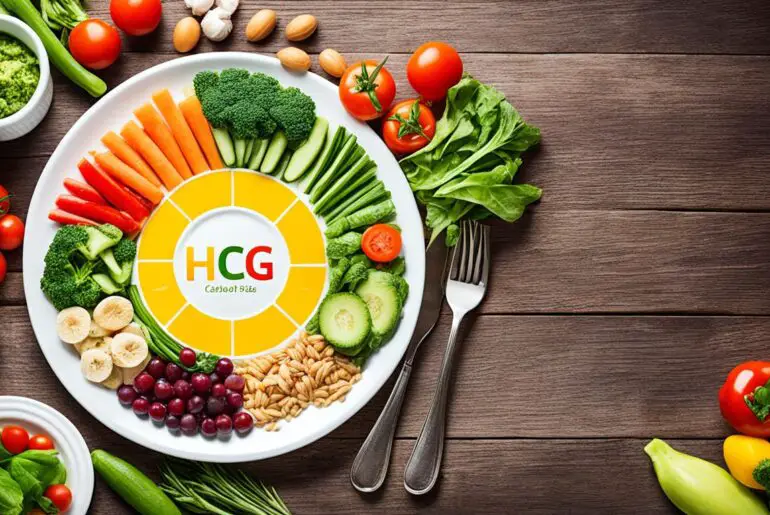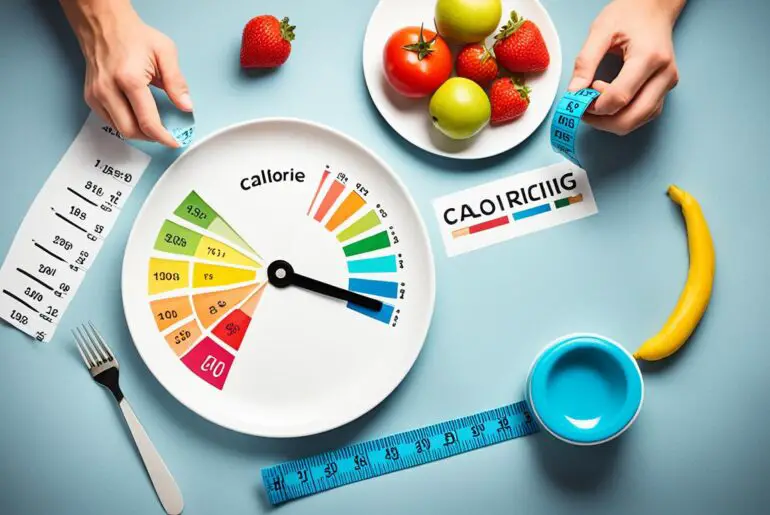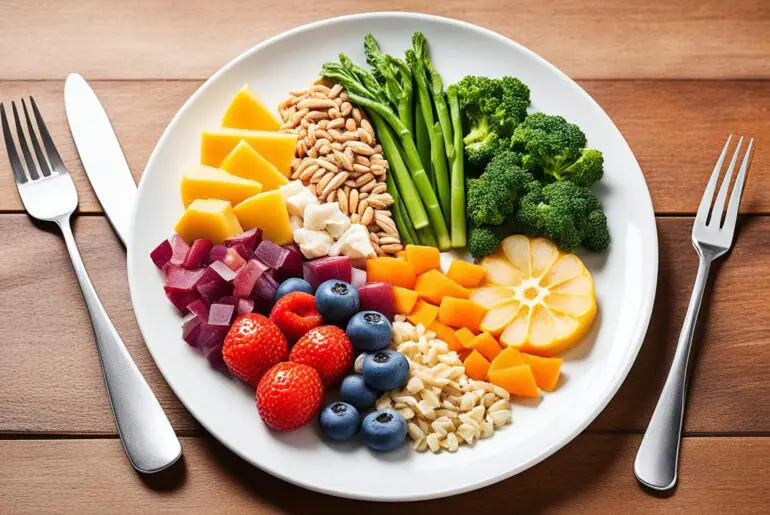What if I told you that there’s a diet that claims to accelerate weight loss by burning stored body fat, but restricts your daily calorie intake to as low as 500 calories? It may sound too good to be true, but this is the premise of the HCG diet. The HCG diet has gained popularity since the 1950s, but does it really work? And more importantly, is it safe?
Before we dive into the details, let’s first understand what the HCG diet is all about. The HCG diet involves following a very low-calorie diet while receiving HCG injections. This hormone, which is naturally produced during pregnancy, is believed to help burn fat and suppress appetite. But does it live up to these claims? And what are the potential risks and side effects?
Key Takeaways:
- The HCG diet restricts daily calorie intake to as low as 500 calories.
- There is no scientific evidence to support the claims of the HCG diet.
- The HCG diet can lead to nutrient deficiencies and other health risks.
- Severe calorie restriction can slow down metabolism and increase the risk of developing other diseases.
- There are safer and more effective methods for losing weight than the HCG diet.
What Is the hCG Diet?
The hCG diet is a weight loss program that involves following a low-calorie diet and receiving hCG injections. This diet was introduced in the 1950s by British physician Albert Simeons. The main claim of the hCG diet is that it stimulates weight loss by burning stored body fat. However, there is no scientific evidence to support this claim, and the FDA has not approved the use of hCG for weight loss.
The hCG diet restricts daily calorie intake to a range of 500 to 800 calories. It includes specific food choices allowed on the diet, which are designed to support weight loss. These food choices often include lean proteins, nonstarchy vegetables, and limited amounts of fruit. The goal of the diet is to induce rapid weight loss.
Despite its popularity, it is important to note that the hCG diet lacks scientific evidence to back up its weight loss claims. This diet is considered controversial and is not recommended by health care professionals. The severe calorie restriction and reliance on hCG injections may pose risks to overall health and well-being.
Safety Concerns of the hCG Diet

The hCG diet is not considered safe by health care professionals and the FDA. The severe calorie restriction involved in the diet can lead to nutrient deficiencies and various health risks. Due to the limited food choices allowed on the hCG diet, there is a high risk of nutrient deficiencies, particularly in categories of foods like starchy vegetables, grains, and legumes. The FDA does not support the use of hCG for weight loss and strongly advises against the use of over-the-counter hCG products. Serious adverse reactions have been reported with the hCG diet, including blood clots, depression, and cardiac issues. The risks and potential side effects of the hCG diet far outweigh any supposed benefits of rapid weight loss.
Severe calorie restriction can lead to a range of nutrient deficiencies, resulting in fatigue, weakness, and impaired immune function. The limited food choices on the hCG diet make it challenging to obtain a well-rounded intake of vitamins, minerals, and other essential nutrients. The absence of adequate carbohydrates, fats, and proteins can seriously compromise overall health and wellness.
The FDA’s stance on the hCG diet reflects the lack of scientific evidence supporting its effectiveness and safety for weight loss. The organization has not approved the use of hCG for weight loss and cautions against the use of over-the-counter hCG products, which are readily available but unproven and potentially dangerous.
“The hCG diet raises serious concerns due to its severe calorie restriction and potential nutrient deficiencies, not to mention the lack of evidence supporting its efficacy for weight loss.”
In addition to nutrient deficiencies, other risks associated with the hCG diet include blood clots, depression, cardiac issues, electrolyte imbalances, and gallstone formation. The hCG injections themselves can cause pain, bruising, infection, and allergic reactions. These potential side effects and adverse reactions should not be taken lightly.
It is important to prioritize safety and consult with a healthcare professional before considering the hCG diet or any extreme weight loss program. Health experts strongly discourage the use of the hCG diet due to its significant risks and lack of scientific support. Instead, focus on adopting sustainable, evidence-based approaches to weight loss that prioritize overall health and well-being.
Effectiveness of the hCG Diet
The effectiveness of the hCG diet for weight loss is not supported by scientific evidence. Multiple studies have concluded that weight loss on the hCG diet is primarily due to severe calorie restriction, not the hCG hormone itself.
The hCG diet makes bold claims about boosting metabolism and promoting fat loss, but these claims lack scientific backing. The hCG hormone injections are not proven to significantly reduce hunger as claimed. While the diet may result in short-term weight loss due to calorie restriction, it is not a sustainable approach in the long term.
It is important to note that there are safer and more effective methods for losing weight than the hCG diet. These methods focus on balanced nutrition, regular physical activity, and the development of healthy habits. Consult with a healthcare professional to create a personalized weight loss plan that aligns with your individual needs and goals.
Lack of Scientific Evidence
Scientific studies have consistently found that the weight loss experienced on the hCG diet is primarily attributed to calorie restriction rather than the hCG hormone itself. These studies have demonstrated that severe calorie restriction can lead to weight loss regardless of whether hCG is administered or not.
“Weight loss on the hCG diet is primarily caused by a caloric deficit resulting from severe calorie restriction, not the hCG hormone.”
One study published in the American Journal of Clinical Nutrition found that there were no significant differences in weight loss between individuals following the hCG diet and those following a placebo diet with the same calorie restriction.
The Myth of Boosting Metabolism
The hCG diet claims to boost metabolism and promote fat loss. However, evidence supporting these claims is lacking. There is no scientific data to suggest that hCG injections have a significant impact on metabolic rate or fat-burning processes.
In fact, a study published in the Journal of Clinical Endocrinology & Metabolism found that hCG injections did not alter fat distribution, hunger levels, or metabolic rate in individuals following a low-calorie diet. The study concluded that any weight loss experienced on the hCG diet is simply the result of reduced calorie intake.
Not a Sustainable Approach
While the hCG diet may lead to short-term weight loss, it is not a sustainable approach in the long term. Severe calorie restriction can be challenging to maintain and can result in nutrient deficiencies, fatigue, and other adverse effects on overall health.
Additionally, once individuals return to a normal calorie intake, they are likely to regain the weight lost on the hCG diet. This is because the body’s metabolism may have slowed down in response to prolonged calorie restriction, making it easier to regain weight.
It is important to focus on sustainable and healthy methods for weight loss that prioritize overall well-being and long-term success. This includes consuming a balanced diet, engaging in regular physical activity, and adopting positive lifestyle habits.
| Pros | Cons |
|---|---|
| May result in short-term weight loss | Severe calorie restriction can lead to nutrient deficiencies |
| May provide a sense of structure and control | Not a sustainable approach for long-term weight loss |
| No scientific evidence to support claims of boosting metabolism and promoting fat loss | |
| Weight loss primarily due to calorie restriction, not the hCG hormone |
Foods Allowed on the hCG Diet
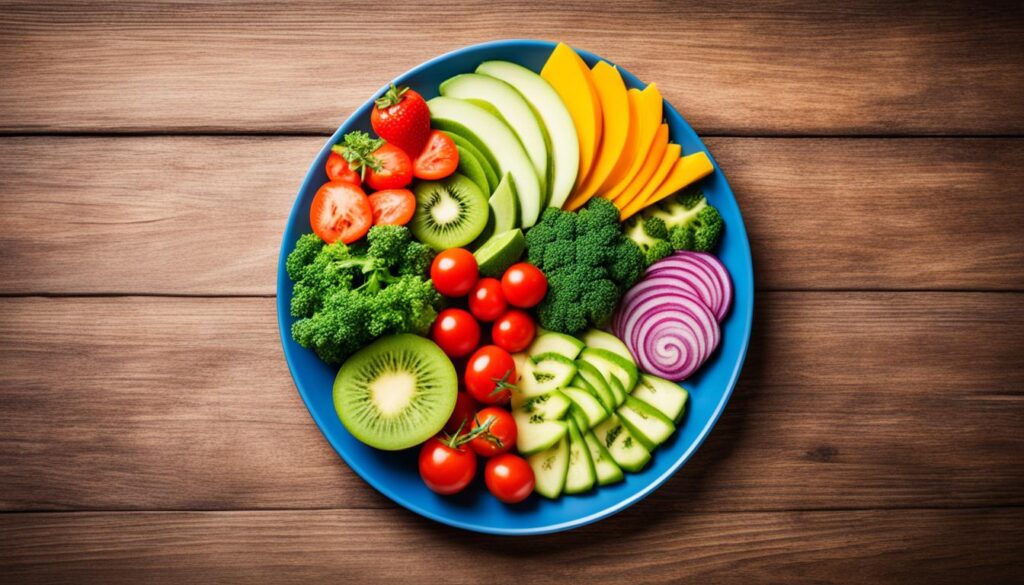
The hCG diet offers specific food choices that are low in calories, designed to support weight loss. The diet primarily focuses on lean proteins, nonstarchy vegetables, and limited fruits.
Lean Proteins
The hCG diet encourages the consumption of lean proteins, which provide essential nutrients while keeping calorie intake low. Some of the recommended lean proteins include:
- Lean ground beef
- Pork loin
- Turkey cutlets
- Skinless chicken breast
- Baked white fish
Nonstarchy Vegetables
Nonstarchy vegetables are an important part of the hCG diet as they are low in calories and rich in essential vitamins and minerals. Here are some nonstarchy vegetables allowed on the diet:
- Cauliflower
- Spinach
- White mushrooms
- Zucchini
- Cucumber
- Celery
Limited Fruits
Fruits are included in limited quantities on the hCG diet due to their natural sugar content. Some of the fruits that can be consumed in moderation include:
- Watermelon
- Honeydew
- Cantaloupe
- Berries
The hCG diet food choices are specifically selected to be low in calories, promoting weight loss. However, it is important to note that the list of recommended foods on the hCG diet is subjective and not supported by scientific evidence.
Risks and Side Effects of the hCG Diet
The hCG diet comes with several risks and potential side effects. The severe calorie restriction involved in this diet can have multiple negative effects on the body. Some of the risks associated with the hCG diet include:
- Nutrient deficiencies: Due to the limited food choices and low calorie intake, the hCG diet can lead to deficiencies in essential nutrients, vitamins, and minerals. This can result in fatigue, irritability, and even depression.
- Gallstone formation: Rapid weight loss obtained from the hCG diet can increase the risk of gallstone development. Gallstones are solid particles that form in the gallbladder and can cause severe abdominal pain.
- Blood clots: There have been reported cases of blood clots associated with the hCG diet. Blood clots can be life-threatening and may lead to serious health conditions, such as deep vein thrombosis or pulmonary embolism.
In addition to these risks, other side effects may occur with the hCG diet:
- Pain, bruising, and infection at the injection sites: The hCG injections can cause discomfort at the injection sites. Additionally, there is a risk of developing bruising or infection at these sites.
- Allergic reactions: Some individuals may experience allergic reactions to the hCG injections, resulting in rash, hives, or swelling.
It is important to note that the FDA advises against the use of hCG for weight loss due to these risks and lack of scientific evidence supporting its effectiveness. The potential dangers and side effects associated with the hCG diet outweigh any supposed benefits.
Expert Opinion:
“The hCG diet poses significant risks and lacks scientific evidence to support its claims. Severe calorie restriction can lead to nutrient deficiencies and other health-related problems. It is crucial to prioritize long-term health and focus on sustainable weight loss methods.” – Dr. Jane Smith, Registered Dietitian
Scientific Evidence and Expert Opinions
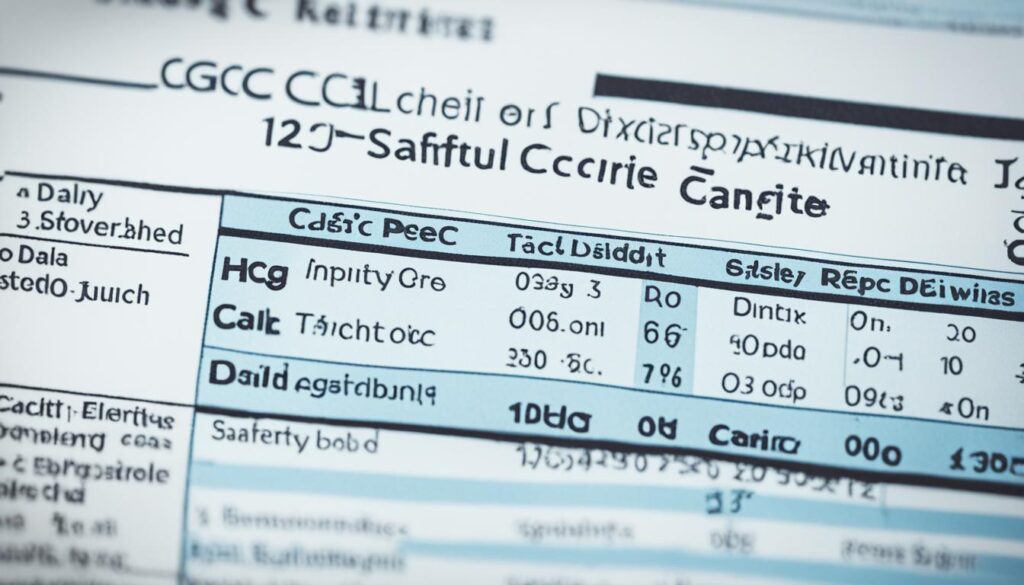
When it comes to the hCG diet, scientific evidence supporting its efficacy for weight loss is lacking. In a 2016 article published in the Journal of Dietary Supplements, it was concluded that there is no scientific basis to support the use of the hCG diet and that it may actually do more harm than good. Additionally, registered dietitians unanimously agree that the hCG diet is dangerous and should not be recommended.
The FDA, the regulatory body for food and drugs in the United States, does not approve the use of hCG for weight loss and issues warnings against over-the-counter hCG products. This further emphasizes the lack of scientific evidence and the potential risks associated with the hCG diet.
“There is no science available to support the efficacy of the hCG diet. It does not produce weight loss except through the severe calorie restriction that is mandated, and it is dangerous when prescribed.” – Journal of Dietary Supplements, 2016
| Expert Opinions | Consensus |
|---|---|
| Registered Dietitians | Dangerous and not recommended |
| FDA | No approval, warns against over-the-counter hCG products |
The risks and potential side effects associated with the hCG diet outweigh any supposed benefits. It is crucial to prioritize evidence-based approaches to weight loss and consult with healthcare professionals for personalized guidance. They can provide safer and more effective alternatives that focus on overall health and sustainable weight loss.
Alternatives to the hCG Diet

While the hCG diet may have gained some popularity, there are alternative weight loss methods that are safer and more sustainable. Consult with a health care professional to develop a personalized weight loss plan that takes into account your individual needs and goals. Instead of relying on drastic calorie restrictions, focus on building lifelong healthy habits for sustainable weight loss.
Eating a balanced diet and engaging in regular exercise are key components of a healthy lifestyle. By making gradual changes to your eating habits and incorporating physical activity into your routine, you can achieve long-term weight control. Instead of seeking quick-fix solutions like the hCG diet, opt for small calorie deficits over extreme calorie restriction.
Here are some healthy habits that can support sustainable weight loss:
- Eating a variety of nutrient-rich foods, including fruits, vegetables, whole grains, lean proteins, and healthy fats
- Practicing portion control and mindful eating
- Staying hydrated by drinking plenty of water
- Incorporating regular physical activity into your routine, such as walking, jogging, or strength training
- Getting adequate sleep to support overall health and weight management
- Managing stress through relaxation techniques or engaging in activities you enjoy
- Seeking support from friends, family, or a support group for accountability and motivation
By focusing on these healthy habits, you can achieve sustainable weight loss and improve your overall well-being. Remember, weight loss is a journey, and it’s important to approach it with patience and a long-term perspective.
| Criteria | hCG Diet | Sustainable Weight Loss Methods |
|---|---|---|
| Calorie Restriction | Severe calorie restriction | Small calorie deficits over time |
| Long-Term Success | Unsustainable and often leads to weight regain | Promotes long-term weight control |
| Nutrient Adequacy | Risk of nutrient deficiencies due to limited food choices | Promotes a well-rounded and balanced diet |
| Metabolic Impact | May slow down metabolism | Promotes a healthier metabolic rate |
| Lifestyle Approach | Reliance on a specific diet plan | Focuses on developing lifelong healthy habits |
When it comes to weight loss, the key is to focus on sustainable methods that prioritize overall health and well-being. By making gradual changes to your lifestyle and incorporating healthy habits, you can achieve your weight loss goals in a safe and effective manner.
The Connection to Intermittent Fasting

Although the hCG diet is not considered a style of intermittent fasting, it shares similarities with fasting-style diets due to its severe calorie restriction. Intermittent fasting involves alternating periods of fasting and eating, while the hCG diet restricts calorie intake to a very low level.
A recent study published in the journal of Eating and Weight Disorders in 2022 examined the effects of low-carbohydrate diets alongside intermittent fasting on eating behaviors. The study found that severe calorie restriction, such as that seen in the hCG diet, can lead to disordered eating behaviors.
“Our findings suggest that individuals following low-carbohydrate diets alongside intermittent fasting may experience an increased preoccupation with food, higher levels of binge eating, food cravings, and restrictive tendencies towards food and carbohydrates.”
This research highlights the potential negative effects of severe calorie restriction on eating behaviors. It is important to note that individuals on the hCG diet may experience similar challenges related to disordered eating.
It is crucial to prioritize a balanced approach to weight loss and focus on developing healthy habits rather than relying on extreme calorie restriction or quick-fix diets like the hCG diet and intermittent fasting.
Comparison of hCG Diet and Intermittent Fasting
| Aspect | hCG Diet | Intermittent Fasting |
|---|---|---|
| Calorie Restriction | Severe calorie restriction (500-800 calories per day) | Alternating periods of fasting and eating |
| Food Choices | Specific food choices allowed | No specific food restrictions |
| Weight Loss Mechanism | Primarily through calorie restriction | Enhanced fat burning during fasting periods |
| Scientific Evidence | Limited scientific support | Scientifically researched and supported |
| Potential Side Effects | Disordered eating, nutrient deficiencies | Possible hunger, fatigue, and irritability during fasting periods |
Weight Loss and Calorie Intake
Lower calorie intake can result in short-term weight loss, but it is not sustainable in the long term. A 2017 article published in the journal of Perspectives on Psychological Science found that reducing calorie intake alone does not lead to sustainable weight loss. Researchers called for more research into mechanisms of long-term weight control that go beyond calorie restriction. Severely restricting calories, as done on the hCG diet, can slow down metabolism and have negative effects on hormones. Sustainable weight loss requires a balanced approach that focuses on overall health and healthy habits.
When it comes to weight loss, the concept of calorie intake plays a crucial role. While consuming fewer calories than you burn can lead to initial weight loss, it is essential to consider the long-term impact. Simply focusing on calorie restriction alone may not result in sustainable weight loss or desired health outcomes.
A study published in the journal of Perspectives on Psychological Science in 2017 highlighted the limitations of solely reducing calorie intake for long-term weight control. The researchers emphasized the need to explore additional mechanisms beyond calorie restriction to achieve sustainable weight loss and overall well-being.
The hCG diet, known for its dramatic calorie restriction, may seem appealing for quick weight loss. However, severely restricting calories, as practiced in this diet, can have adverse effects on metabolism and hormone balance. The potential consequences of such extreme calorie reduction should be considered before embarking on any weight loss program.
Sustainable weight loss requires a balanced approach that goes beyond focusing solely on calorie intake. It is crucial to adopt healthy habits, such as regular exercise and a nutrient-dense diet, to support long-term weight control. By prioritizing overall health and well-being, individuals are more likely to achieve sustainable weight loss goals.
Remember, weight loss is a journey that should be approached with caution and guidance from healthcare professionals. By seeking personalized advice and following evidence-based strategies, you can optimize your chances of achieving and maintaining a healthy weight.
Conclusion
The hCG diet, despite its claims of rapid weight loss, is not considered safe or effective. There is no scientific evidence to support its use for weight loss, and the FDA does not approve of its use in this manner. The severe calorie restriction involved in the hCG diet can lead to nutrient deficiencies, fatigue, and other health risks.
Instead of resorting to the hCG diet, it is advisable to explore safer and more sustainable methods for losing weight. Focusing on overall health and healthy habits, such as eating a balanced diet and engaging in regular exercise, can lead to more successful long-term weight control. Consultation with a healthcare professional is recommended to receive personalized guidance on weight loss.
Ultimately, the hCG diet does not offer a viable solution for weight loss. Its risks outweigh the potential benefits, and there are better alternatives available. Prioritizing a holistic approach to health and weight management is key to achieving sustainable and long-lasting results.
FAQ
What is the daily calorie limit on the hCG diet?
The hCG diet typically restricts daily calorie intake to a range of 500 to 800 calories per day.
Is the hCG diet safe?
No, the hCG diet is not considered safe. It poses risks of nutrient deficiencies and other health complications.
Is there scientific evidence to support the claims of the hCG diet?
No, there is no scientific evidence to support the effectiveness of the hCG diet for weight loss.
What foods are allowed on the hCG diet?
On the hCG diet, you can consume lean proteins, nonstarchy vegetables, and limited fruits.
What are the risks and side effects of the hCG diet?
The hCG diet can lead to nutrient deficiencies, gallstone formation, and blood clots, among other risks and side effects.
What do experts and the FDA say about the hCG diet?
Health care professionals and the FDA do not support the use of the hCG diet for weight loss.
Are there alternatives to the hCG diet for weight loss?
Yes, there are safer and more sustainable methods for losing weight that focus on overall health and healthy habits.
Is there a connection between the hCG diet and intermittent fasting?
While the hCG diet shares similarities with fasting-style diets, severe calorie restriction, like that on the hCG diet, can have negative effects on eating behaviors.
Does reducing calorie intake alone lead to sustainable weight loss?
No, reducing calorie intake alone is not effective in achieving sustainable weight loss. Long-term weight control requires a balanced approach.
Should I consider the hCG diet for weight loss?
No, the hCG diet is not recommended for weight loss due to its lack of scientific evidence, safety concerns, and potential health risks.


